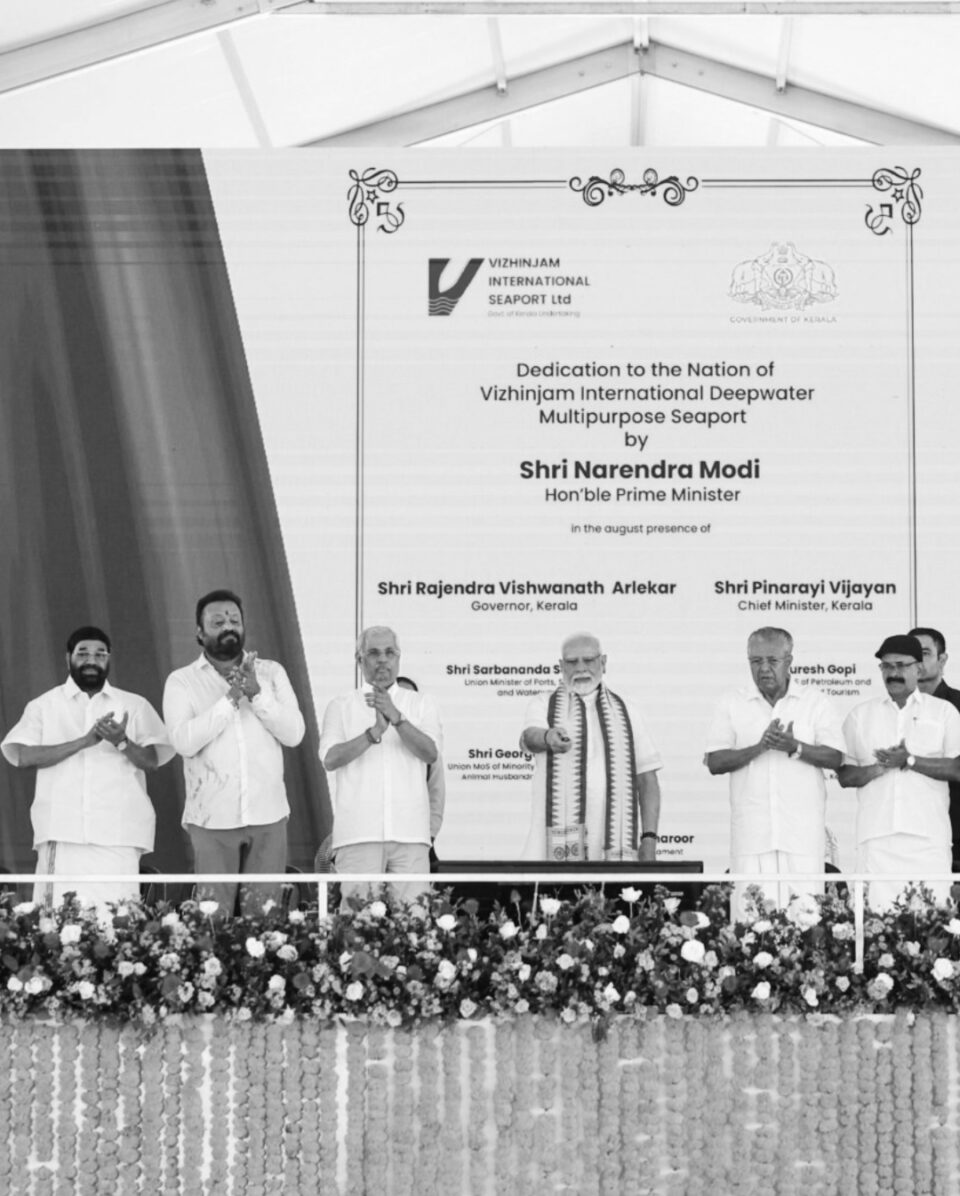Prime Minister Narendra Modi dedicated the Vizhinjam International Deepwater Multipurpose Seaport, valued at Rs 8,800 crore, to the nation in Thiruvananthapuram, Kerala, coinciding with the birth anniversary of Bhagwan Adi Shankaracharya. During his address, he recalled his visit to Adi Shankaracharya’s birthplace three years ago and the installation of a grand statue in Kashi, which honors Shankaracharya’s spiritual wisdom. He also unveiled a statue at Kedarnath Dham, while announcing the temple’s reopening to devotees. PM Modi touted Shankaracharya’s contributions to national consciousness and unity.
He described the Vizhinjam Deep-Water Sea Port as a beacon of modern development, projecting that its capacity will triple, allowing large cargo ships to dock and reducing reliance on foreign ports for transshipment operations. PM Modi expressed optimism that the port would create economic opportunities for Kerala and keep revenue within India.
He reflected on India’s historical maritime prowess, especially Kerala’s pivotal role in trade. He emphasized the government’s commitment to enhancing port infrastructure, promoting ease of doing business, and integrating transportation networks under initiatives like PM Gati Shakti and the Sagarmala Project. Modi noted significant growth in Indian seafarers from 1.25 lakh to over 3.25 lakh, positioning India among the top three countries in this sector.
PM reflected on the significant changes in India’s maritime sector over the past decade, noting that ships once faced long wait times at ports, which delayed operations and impacted the economy. He highlighted that ship turn-around times at major ports have improved by 30%, enhancing efficiency and allowing India to manage larger cargo volumes faster. The Prime Minister celebrated India’s expansion of port capacity and National Waterways, which have grown eightfold, positioning two Indian ports among the top 30 globally and improving India’s ranking in the Logistics Performance Index.
PM Modi introduced the Maritime Amrit Kaal Vision, a roadmap for advancing India’s maritime strategy, focusing on global trade positioning. He emphasized the importance of partnerships with the private sector, which have led to substantial investment, modernization of ports, and enhanced efficiency. The establishment of a shipbuilding and repair cluster in Kochi was noted as a key development, promising new employment opportunities for local youth.
He underscored the ambitious new shipbuilding policy introduced in the recent Union Budget aimed at boosting manufacturing and benefiting MSMEs. Highlighting Kerala’s developmental progress, PM Modi pointed out improvements in infrastructure such as highways, railways, and ports, and noted the introduction of modern Vande Bharat trains, further enhancing connectivity in the region.
PM Modi emphasized the Government of India’s conviction that Kerala’s development is vital to the nation’s overall growth, operating through cooperative federalism to enhance Kerala’s progress in social aspects over the last decade. He pointed out various beneficial initiatives for the state’s residents, such as the Jal Jeevan Mission, Ujjwala Yojana, Ayushman Bharat, and the Pradhan Mantri Suryagarh Free Electricity Scheme. Stressing the significance of fishermen’s welfare, Modi announced major funding for projects under the Blue Revolution and Pradhan Mantri Matsya Sampada Yojana, including the modernization of critical fishing harbors like Ponnani and Puthiyappa. Additionally, he mentioned that thousands of fishermen received Kisan Credit Cards, allowing access to financial support amounting to hundreds of crores.
Highlighting Kerala’s legacy of harmony and tolerance,PM Modi referenced the establishment of Saint Thomas Church, one of the oldest churches globally. He acknowledged the recent passing of Pope Francis, describing it as a moment of grief affecting people worldwide. President Droupadi Murmu represented India at his funeral, reflecting national respect. PM Modi conveyed heartfelt condolences to those in mourning, paying tribute to the Pope’s spirit of service and inclusivity within Christian traditions. He shared personal reflections on his interactions with the Pope, expressing gratitude for their discussions on humanity, service, and peace, which continue to inspire him.

